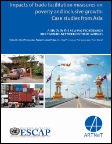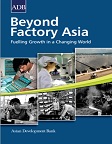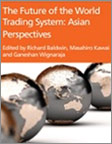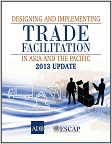 Impacts of Trade Facilitation Measures on Poverty and Inclusive Growth: Case Studies from Asia - A Study by the Asia-Pacific Research and Training Network on TradeThis book addresses the gap between trade facilitation and poverty reduction and contains a compilation of specific case studies that explores the linkages between trade facilitation measures and poverty. It also presents cross-country analysis that examines inequality in low- and middle-income countries. Other chapters discuss economic corridors and microfinance development as trade facilitation measures and examine access to trade facilitation by export-oriented micro, small, and medium-sized enterprises. It also explores barriers to international entrepreneurship for the vegetable business in Bangladesh. Finally, it offers a comprehensive evaluation of the effectiveness of Export Processing Zones (EPZs) on poverty reduction. Author: Ravi Ratnayake, Rajan Sudesh Ratna, Martina Francesca Ferracane and Yann Duval Year: 2013 Download Tags: Trade Facilitation, Bangladesh, Trade, Poverty Reduction, Economic Corridor, Small and medium enterprises, India, SAARC, Customs, Pakistan  Beyond Factory Asia: Fuelling Growth in a Changing WorldThis paper assesses the challenges of Factory Asia – a model of regional networks connecting production centers in different Asian economies. It forms part of regional and global value chains and constitutes an important source of growth in the region. Regional cooperation is vital to the success of Factory Asia, which calls for greater South-South cooperation to leverage knowledge in domestic manufacturing, allowing countries such as India to leapfrog to higher value chains. For Bangladesh and Sri Lanka with small domestic markets, strategic options include carving out a niche in lower-value manufacturing. The paper further argues that policymakers should be wary of expanding or increasing the number of free trade agreements for the growth or spread of production networks. Author: Asian Development Bank Year: 2013 Download Tags: South Asia, Regional Cooperation, Trade Policy, Manufacturing, Exports, Small and medium enterprises, India, Agriculture, Bangladesh South Asia Energy Security: Challenges and OpportunitiesThe imbalance between the growing demand for energy in South Asia and the countries' uneven energy resources has led to weakened energy security in the region. Import dependence from outside the region has become a costly solution. As countries in South Asia move to expand their economies, fostering cross border energy trade and promoting energy investment opportunities could be a better alternative to resolving the energy deficit. However, energy cooperation within South Asia is challenged by major issues that could impede regional energy trade that is beneficial for all. Author: Bhupendra Kumar Singh Year: 2013 Download Tags: Energy, South Asia, Bangladesh, Bhutan, India, Nepal, Pakistan, Sri Lanka, Trade, Hydropower Reducing Poverty by Closing South Asia's Infrastructure GapThis report takes a critical look at inter-and intra-regional infrastructure of South Asia and explores inequality of access across space and time. It gives an approximate total cost of regional infrastructure needs and investment trends in the South Asia region, along with a proposed framework on ranking of infrastructure needs. The report also examines better usage of existing resources and policy options to help the poorest gain better access to infrastructure.
Finally, it recognizes the enormity of infrastructure deficiencies in South Asia and acknowledges that a good mix of infrastructure investment and supportive reform implementation will enable the region to close the infrastructure gap. Author: Luis Andrés, Dan Biller, and Matías Herrera Dappe Year: 2013 Download Tags: Transport, South Asia, Infrastructure, Energy, Roads, Railway, Water Supply, Bangladesh, Bhutan, Nepal, India, Sri Lanka, Maldives  The Future of the World Trading System: Asian PerspectivesAccording to WTO Director-General Pascal Lamy, the problems facing Asian regionalism are a scaled-down version of the problems facing the world. Thus, solutions that address Asia’s noodle bowl would most likely work at the global level. This concise collection of short chapters is based on longer papers presented at the Geneva Conference on 11-12 March 2013, organized by the Asian Development Bank Institute and Centre for Trade and Economic Integration at the Graduate Institute of International and Development Studies, in collaboration with WTO. The chapters are written by leading Asian and international trade experts on key changes taking place in the world trading system and its policy implications for Asia. Author: Richard E. Baldwin, Masahiro Kawai, and Ganeshan Wignaraja, eds. Year: 2013 Download Tags: Regional Integration, Trade Policy, Trade, Global Value Chains, Global Production Network, Regional Trade, Trade Facilitation, India Connecting South Asia and Southeast Asia: Interim ReportThis joint ADB-ADBI study focuses on how improved physical connectivity (infrastructure) and associated institutional connectivity (software) can enhance more effective economic integration between the two subregions. The report reviews economic ties, identifies issues and constraints, and explores better connectivity and closer economic integration. It also examines major developments in South Asia-Southeast Asia trade and investment, economic cooperation, role of economic corridors, and regional cooperation initiatives. Author: ADB and ADBI Year: 2013 Download Tags: Infrastructure, Economic Integration, Regional Cooperation, Trade, Transport, Trade Facilitation, Economic Corridor, Energy  Attracting Foreign Direct Investment: What Can South Asia's Lack of Success Teach other Developing Countries?Despite South Asian nations experiencing increased foreign direct investment (FDI) flows over the past decade by gaining a large share of cross border investments, FDI inflows in South Asian countries still remain the lowest relative to gross domestic product (GDP) among developing country regions. This paper uses an empirical model that accounts for possible trends in convergence in the ratio of FDI to GDP between countries and cross-sectional data for 78 countries from 2000 to 2011. In examining the historical patterns of South Asia’s FDI and its connection with the policy environment, policymakers can identify constraints to FDI and boost potential for broad-based growth. Author: David M. Gould, Congyan Tan and Amir S. Sadeghi Emamgholi Year: 2013 Download Tags: South Asia, Trade Policy, FDI, GDP, Investment, Governance, Transparency, Economic Growth, Financial Sector, Regional Cooperation, Trade UNCTAD Handbook of Statistics 2013This UNCTAD Handbook of Statistics provides essential data for analyzing and measuring world trade, international financial flows, investment, and development. It documents the south-south trend led by developing Asia and reveals how exports among developing countries remain centered in the Asian region. The share of south-south trade in total world exports doubled over the last 20 years to over 25 per cent. Apart from The People's Republic of China and other major petroleum and gas exporters, India is among the countries that have most expanded their south-south trade during the last two decades. Author: United Nations Conference on Trade and Development Year: 2013 Download Tags: South Asia, Statistics, Trade, India Evaluating Aid for Trade on the Ground: Lessons from BangladeshThis paper assesses the effectiveness and impact of aid for trade (AfT) in Bangladesh in a series of eight country studies by the International Center for Trade and Sustainable Development. The study argues that the results for AfT are mixed for Bangladesh since it has addressed supply side constraints and contributed to enhancing export competitiveness. However, lack of efficient administrative mechanisms, limited human capacity, and political instability that lead to low absorption capacity limits the overall effectiveness and impact of AfT in Bangladesh. Author: Fahmida Khatun, Samina Hossain and Nepoleon Dewan Year: 2013 Download Tags: Bangladesh, Trade, Aid for Trade, Sustainability, Export, Development, Asia, Gender, LDC, Least Developed Countries The ASEAN Economic Community: A Work in ProgressThis publication explores the barriers and impediments to the realization of an ASEAN Economic Community (AEC), and to what extent its self-imposed deadline of 2015 for achievement of an AEC is more of a milestone of progress than a firm target. It examines whether the AEC is achievable, the obstacles faced in achieving it, and the measures required to help it become a reality. Author: Asian Development Bank Year: 2013 Download Tags: Regional Cooperation, Regional Integration, Trade Policy, ASEAN, Economic Integration, Regional Cooperation, ADB, Regional Integration, Services, Global Value Chains, Non-Tariff Measures, Asia-Pacific Trade Agreement, India, Trade Facilitation ADB Regional Cooperation Operations Business Plan (RCOBP) 2014-2016 for South AsiaADB's third Regional Cooperation Operations Business Plan (RCOBP) 2014-2016 for South Asia under its South Asia Regional Cooperation Strategy (RCS) 2011-2015 details a cumulative indicative lending program of $3.3 billion and maintains focus on improved regional connectivity, increased cross-border trade, and strengthened regional economic cooperation. Author: Asian Development Bank Year: 2013 Download Tags: Regional Cooperation, Regional Integration, Bangladesh, Bhutan, India, Maldives, Nepal, Sri Lanka, Trade Facilitation, Transport, Energy, SAARC Review of Developments in Transport in Asia and the Pacific 2013While transport has been an essential element in the rapid growth and economic development of Asia and the Pacific, the sector is now at a crossroads more than ever before. Rocketing demand for transport services is putting extreme pressure on existing infrastructure at a time when public budgets are constrained and awareness about the negative externalities of transport activities is growing. Author: United Nations Year: 2013 Download Tags: Transport, Infrastructure Deepening Economic Cooperation between India and Sri LankaThis book analyzes the performance and impact of the India-Sri Lanka free trade agreement over the past decade and suggests the way forward. India became an important source of imports for Sri Lanka immediately after the implementation of the free trade agreement. Author: Asian Development Bank Year: 2013 Download Tags: Regional Cooperation, Trade Policy, India, Sri Lanka, Trade, Economic Cooperation, India-Sri Lanka Free Trade Agreement, Free Trade Agreements, Services, Trade Facilitation, Exports, Import Who Profits from Trade Facilitation Initiatives?This Asia-Pacific Research and Training Network on Trade (ARTNeT) Working Paper uses firm-level data on developing countries to investigate whether large firms benefit from trade facilitation. The findings show that firms of all sizes export more in response to improved trade facilitation. Trade facilitation can be beneficial to countries, including those engaged as suppliers in value chains. Author: Bernard Hoekman and Ben Shepherd Year: 2013 Download Tags: Trade Facilitation, Trade Policy World Development Indicators 2013This 2013 World Development Indicators report compiles important statistics about global development organized around six themes- world view, people, environment, economy, states and markets, and global links. Relevant market changes, such as the rise in foreign direct investments or the decrease in official development assistance, are tracked. It also contains a hyperlinked index to comprehensive indicator data available online. Author: World Bank Year: 2013 Download Tags: Statistics, Development Financing Low-Carbon UrbanDevelopment in South Asia: A Post-2012 Context The cities of South Asia are growing at an unprecedented rate. Currently, the region
accounts for 5 of the world's 26 megacities (Delhi, Dhaka, Karachi, Kolkata, and
Mumbai),with Kolkata and Mumbai being the most dense. The urban population in
India is expected to increase by 20.8 percentage points between 2010 and 2050 compared
to 7.8 percentage points in Latin America and the Caribbean. These trends necessitate bold
efforts in project design and financing to steer this rapid urbanization onto an inclusive, green,
and low-carbon urban development path. Author: Asian Development Bank Year: 2013 Download Tags: Climate, Energy, India, South Asia, Kyoto Protocol, Bangladesh, Bhutan, Nepal, India, Maldives, Sri Lanka ARIC Information Pack: October 2013The ARIC Information Pack compiles news and events on regional cooperation & integration (RCI) that corresponds to ADB's four RCI pillars: cross-border infrastructure, trade and investment, money and finance, and regional public goods. A special feature on the implications of the US recovery to Asian exports also appears in this issue. Author: Asian Development Bank Year: 2013 Download Tags: Regional Cooperation, Regional Integration, ADB, SASEC Bhutan Critical Development ConstraintsBhutan 2020: A Vision for Peace, Prosperity and Happiness embodies the development philosophy
of His Majesty King Jigme Singye Wangchuck and sets out directions that will enable Bhutan to
execute this philosophy while at the same time retaining its commitment to its distinctive model
of harmonious and balanced development. Author: Asian Development Bank / Australian Government / Japan International Cooperation Agency Year: 2013 Download Tags: Bhutan, Development Aid for Trade: An Investment Benefit Road Map for South AsiaAid for Trade (AfT) came to prominence just over a decade ago at the launch of the
World Trade Organization's Doha Round. With its focus on helping least developed
countries and economies escape the poverty trap, it aims to strengthen their
capabilities to meet market demand and to reduce supply-side constraints such as a lack of
trade infrastructure. Author: Asian Development Bank Year: 2013 Download Tags: Trade Policy, Poverty Reduction, Infrastructure, India, Bangladesh, Bhutan, Maldives, Sri Lanka, Nepal, Trade Facilitation, Transport, Global Value Chains, Exports Energy Outlook for Asia and the Pacific: October 2013The Energy Outlook for Asia and the Pacific aims to support ADB energy sector operations
by providing stakeholders with an energy outlook for the region up to the year 2035.
It attempts to identify policy, social, infrastructure, and technology issues that must be
addressed to meet future energy need of ADB members in Asia and the Pacific. Author: Asian Development Bank Year: 2013 Download Tags: Energy, Infrastructure, Renewables, Hydropower, Transport, Bangladesh, Bhutan, India, Nepal, Maldives, Sri Lanka Climate Action South Asia: Information Update No. 3 (The Economics of Climate Change in South Asia: Adaptation and Impact Assessment)Analyses show that the cost of early action on climate change in South Asia is lower than
the cost of damage brought about by climate change impacts. In physical terms, the region
will face water shortage and agricultural food production losses, which are vital to achieving
poverty reduction and other Millennium Development Goals (MDGs). Author: Asian Development Bank Year: 2013 Download Tags: Economics, Climate, Agriculture, Climate Change, Environment, South Asia, Milennium Development Goals, Sustainability, Bangladesh, Bhutan, India, Nepal, Maldives, Poverty Reduction, Hydropower, Energy Climate Action South Asia: Information Update No. 2 (Economics of Reducing Greenhouse Gas Emissions in South Asia: Options and Costs)The study Economics of Reducing Greenhouse Gas Emissions: Options and Costs in Bangladesh, Bhutan, the Maldives, Nepal, and Sri Lanka reveals excellent opportunities in low-carbon green growth by pursuing resource- and energyefficient technologies that would lower emissions of greenhouse gases at low cost or even cost saving (benefits). Author: Asian Development Bank Year: 2013 Download Tags: Economics, Climate, Climate Change, Economics, South Asia, Bangladesh, Bhutan, Maldives, Sri Lanka, Energy, Environment, Sustainability, ADB, Nepal, Development, Hydropower  Designing and Implementing Trade Facilitation in Asia and the PacificThis reference book was published to support the implementation of trade facilitation measures and reforms in Asia and the Pacific. It includes operational guidance on assessing the status of trade facilitation, the measures and reforms needed, how to design trade facilitation initiatives, and how to implement them at national and regional levels. The book is intended to assist policy makers, practitioners, and economists by bridging the gap between theory and practice. The revised 2013 version includes updated statistical figures and data, information on actual trade facilitation policies and practices, and the most recent research on trade facilitation. Author: Asian Development Bank / United Nations Economic and Social Commission for Asia and the Pacific Year: 2013 Download Tags: Trade Facilitation, Regional Cooperation, Regional Integration, Trade Policy, Economic Corridor, Sanitary and Phytosanitary Measures, Technical Barriers to Trade, Revised Kyoto Convention, Customs, Customs Valuation, Bangladesh, Bhutan, India, Nepal, Maldives, Sri Lanka, Services |




